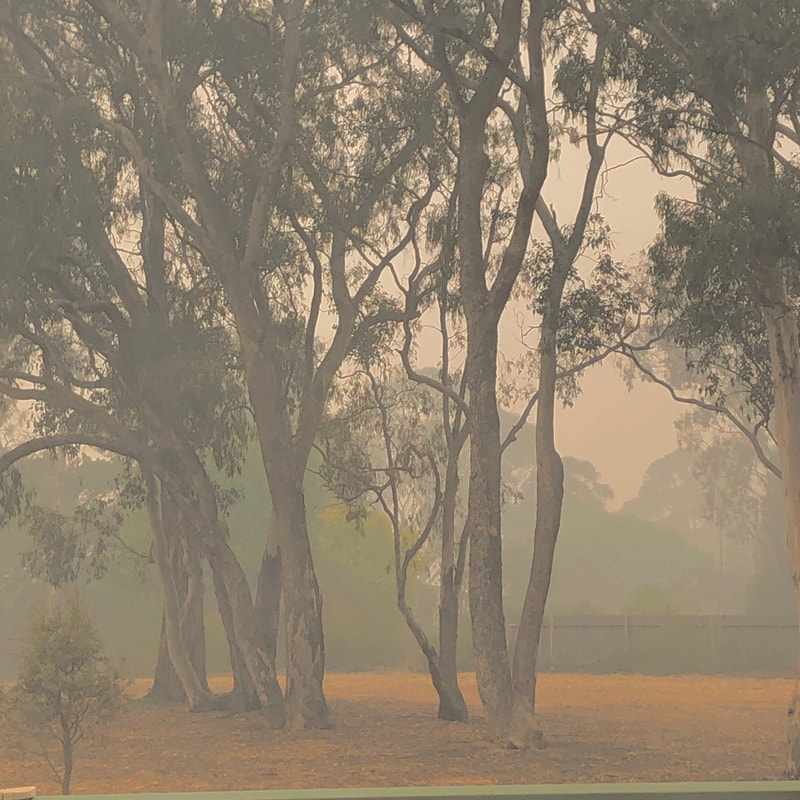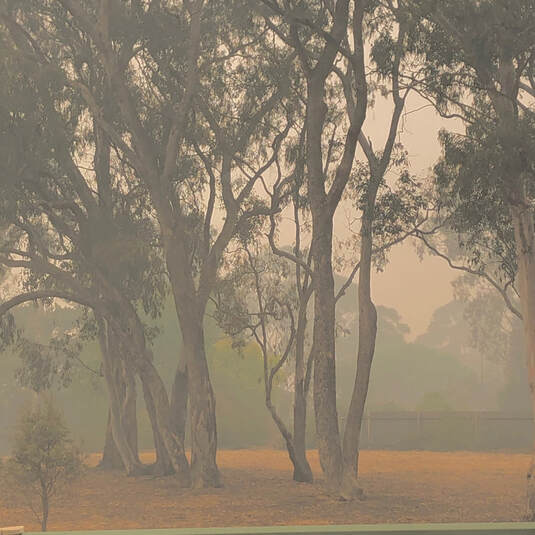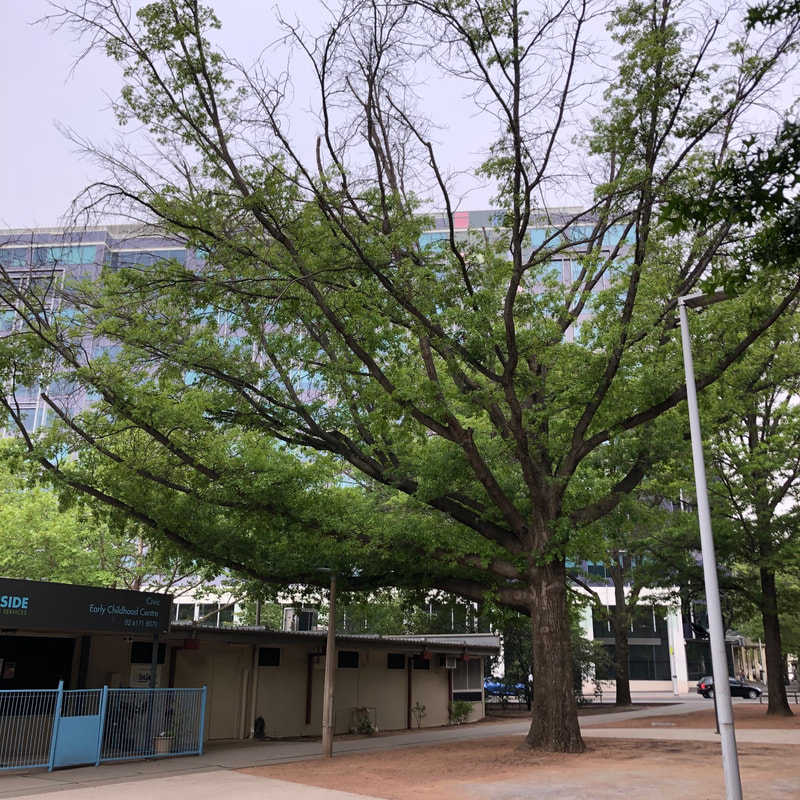| The tragedy of the brutal fires sweeping through eastern Australia, with images of apocalypse-red skies and horror stories of loss and grief, seems to keep on unfolding, grimly marching onwards as the weeks go by. It’s only the beginning of January - the fire season has at least another two months to run. It feels as if we’re in for the long haul. Thankfully we are still safe here in Canberra from any imminent bushfire threat, although the terrible air quality poses its own significant health risks. |
Here in Canberra, we cope by staying indoors when the smoke gets bad, keeping the windows shut and running air filters, and limiting time outdoors and many of us wearing masks as we briefly dash outside. I am acutely aware that if this smoke is so toxic to humans, it must then, by definition, also be toxic to other creatures too. Many species share the same respiratory mechanisms as us, so the increased risks must also apply to them. Do birds experience an increased risks of strokes and heart attacks from inhaling the fine particles of soot, I wonder, as I hurry across the road to feed my neighbour’s chickens while they are away, holding my mask tight against my face to keep the acrid smell from entering my nose. Perhaps I’m particularly paranoid about making sure I wear a mask, but then I am an asthmatic and I am getting a bit wheezy these days. (Our windows don’t seal terribly well so the smoke has been gradually seeping indoors, despite our best efforts with the air filter.) What about kangaroos, wallabies, koalas and wombats even - do they experience acute respiratory distress or asthma-like symptoms? I imagine that they do. And of course, all species must be experiencing eye, nose and throat irritation where these apply.
We know that fires have always been part of the Australian landscape, but the sheer scale of this fire season is staggering, and marks a significant departure from what has been the historical norm. With over 5 million hectares burned already, that is a massive amount of damage that, particularly in sensitive forest ecosystems, may take years or even decades to regenerate. Looking at maps of the extent of the fires, it feels like almost every forest between Canberra and the coast has gone up in flames. Even with a brief respite of rain forecast for Monday, it looks like the snowy mountains will be next.
In short, beyond the immediate threats of the fires themselves, there is likely to be ongoing sickness and mortality of wildlife, with large swathes of habitat and food sources gone, or only able to recover slowly, as well as much larger areas affected by toxic smoke. I’m sorry this is all rather bleak, but unfortunately that is the grim reality going on out there, on our doorstep.
I didn’t stay long outdoors in the garden but I was heartened to hear that some birds at least were indeed still chirping and warbling in the trees. The little skinks were still dashing about in the undergrowth. The lemon balm was covered in bees. Even the neighbour’s old chickens were still crowing and waiting to be fed. The baby corn and beans are still bursting out of the ground, even if their new leaves are getting burned by the hot winds. But they are still growing, that irrepressible life force still pushing them upwards into the smoky air.
And here is the point of this post: Nature doesn’t give up when the going gets tough. Nature may be being massively stressed and damaged in all sorts of ways right now, but it won’t just lay down and die politely. It keeps on going, fighting, breathing, living, even in tiny pockets where everything seems lost. The life forms around us all have a very strong will to live. And for me that is an inspiring, even hopeful, thought to hold onto as the country braces itself for the next few days of heat and likely further fire disasters. I am not trying to minimise the horrible devastation being wrought to humans or to Nature, or to suggest that our fellow beings don’t need our help - they clearly do. What I am saying is that for me at least, Nature is offering a clear lesson in not giving up or succumbing to despair about the state of things right now.
With the scale of the devastation being wrought in these fires, and the various dire warnings in the media about tipping points, feedback loops and the apocalyptic dry, hot and burning future to follow, it’s easy to feel completely overwhelmed and despairing about what is happening to our environment. Over this year I have spent a good deal of time reading books and reports about species extinctions and the threat of catastrophic climate change and, to be perfectly frank, this knowledge is really terrifying. It’s not something that is easy to absorb and reconcile into your daily life. If you read the Guardian or the ABC news you have probably come across similar information. It is often very hard to know what to do with this knowledge, especially when these issues are so global and it can seem that the things we do as individuals are inconsequential in the grand scheme of things. But yet, many of the environmental problems facing us today are fundamentally ‘tragedy of the commons’ issues - that is, although our individual impacts are tiny, when large populations all do the same things, then our combined impact is huge. Those impacts could be from anything that we humans do: how much we drive, what we buy, how we choose to holiday, what fuels we use, what we eat, and so on.
This is important because it means that although it seems that what we do individually is negligible, if all of us (or even a substantial number of us) did things differently, the effects would actually be enormous. I’m not trying to suggest that we don’t need political leadership on global environmental issues when we clearly do. But, it can be heartening and empowering to realise that everything that you do is important too.
What form that action takes is up to you, but if you have a garden or verge in Canberra, here is one simple thing you could do right now if you aren’t already: give it some water. Put out a little saucer of water with some pebbles in it to give insects a drink too. Take a tour outside (don’t forget to wear a mask if you need to) and see what plants are struggling right now. I have seen the normally hardy shrub, viburnum tinus, nearly dead in gardens at the moment. Its pretty little flowers are great bee forage in late winter. Maybe check your neighbour’s garden too, especially if they are away. There are also street trees under significant stress and large trees provide an enormous amount of habitat for little creatures, not to mention moderating high temperatures - let’s not lose them if we don’t have to.
So it makes sense to make judicious use of Canberra’s water to keep your gardens and Canberra’s urban forest alive. Note that even with rainfall forecast for this coming Monday (6th January), it’s unlikely that this will be enough to break the drought.
The simple act of ensuring your garden plants are kept alive in this awful weather might seem insignificant, but it is important for myriad reasons. Here are just a few:
- Suburbs can be surprisingly biologically diverse: more species than you might think may live in or travel through your garden. Right now there are a lot of stressed creatures out there in the smoke. The better health of your garden, the better chance we give some of our fellow creatures.
- Normally hardy shrubs and trees are dying in the current dry weather and it’s not worth losing mature shrubs and trees out of a sense of being water wise - they provide crucial shade on hot days and lower the overall temperature of the city.
- Trees and shrubs in your garden are storing a lot of carbon too, and continue to store more every day. Dead plants can’t absorb any more carbon and a substantial amount is released when they break down.
- Tree and shrub roots keep microbes alive beneath the ground, feeding and exchanging nutrients, keeping the soil alive. Dead plants = dead soil = more carbon release.
- Oh, and did I mention that tree leaves (indeed all leaves) slowly filter smoke and dust out of the air? Not super quickly unfortunately, but all the plants around us are quietly getting on with the business of cleaning the air.
- And perhaps most relevant for the time being: a dry garden catches fire a lot more easily than a well-watered one will. Dead plants are kindling. On the other hand, a well-hydrated garden of suitable plants is quite fire retardant. Deciduous fruit trees are good. So are vegetables. All of these plants have moist leaves which take energy out of a fire or retard ember attacks. Ornamental deciduous trees, including pears, plums and crab apples are also very good: a stand of mature Manchurian Pear trees is reported to have held back an ember attack and helped protect a street in Curtin during the 2003 Canberra bushfires. But remember that any tree, deciduous or not, becomes flammable if it dries out. We have been watering daily to keep things alive in the harsh dry weather and will continue to do so, to keep our garden productive, as well as ensuring it remains, as much as possible, a viable habitat for the other species that share it with us. We are also using all the grey water from the shower and laundry in the garden. The garden doesn’t exactly look lush, but it’s alive.
So, please keep watering your garden. If you can use some grey water or have water harvesting infrastructure all the better, but plain old tap water will do. Obviously don’t be wasteful, and water at the right times of day, but don’t let things die unnecessarily. Not while the ACT has enough water and minimal water restrictions. While this ridiculous dry period remains with us, don’t forget to keep things alive, so they in turn, can keep us alive too.
It’s only a very small thing, but it’s something you do have control over. And if lots of us do it, the effect will be significant. Nature doesn’t give up easily in the fight for life. Neither should we: our job is to protect, revegetate and regenerate what we can and the simple act of caring for and watering stressed vegetation is one tiny step among many that we can take in that direction. Everything is connected.
Stay safe everyone.




 RSS Feed
RSS Feed